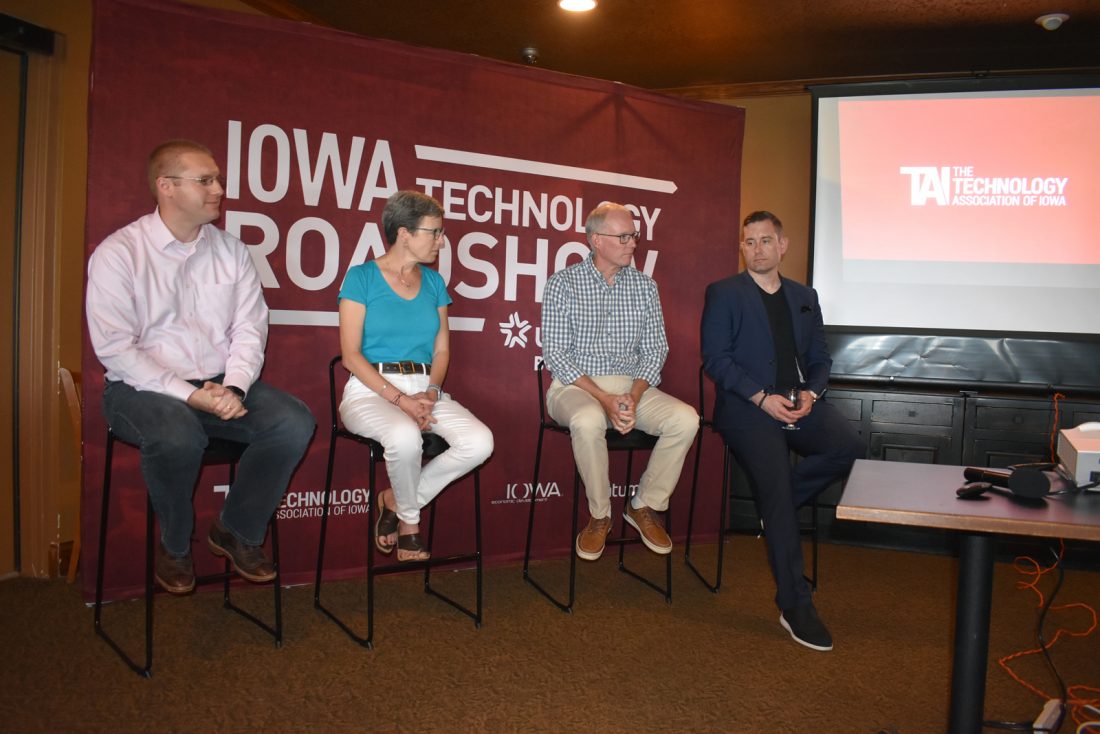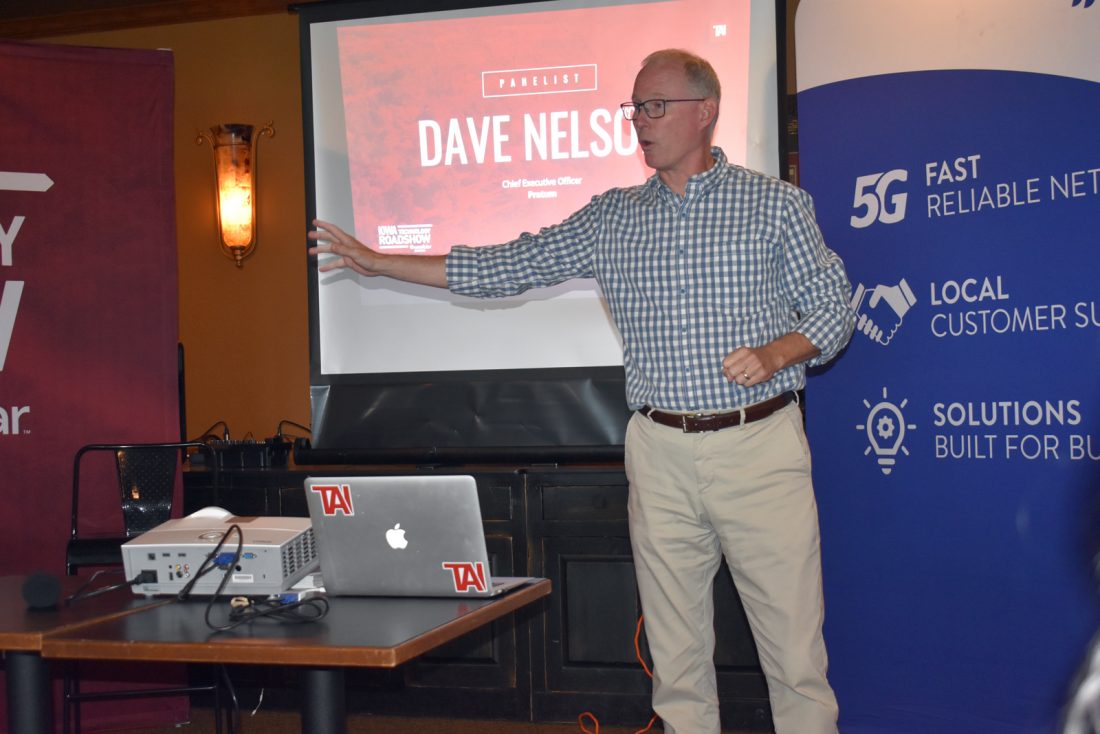5G, data and privacy | News, Sports, Jobs – Fort Dodge Messenger
-Messenger photo by Chad Thompson
James Rose, senior manager of solution architects at UScellular, speaks during an Iowa Technology Roadshow at Willow Ridge Golf Course and Restaurant on Tuesday.
James Rose, senior manager of wireless solution architects for UScellular, believes that before he retires, astronauts on the moon will be able to FaceTime with someone on Earth.
“Just before the pandemic hit, NASA made an announcement that they awarded Nokia with a contract with a 4G network and an award to SpaceX to put a full space station on the moon,” Rose said Tuesday during an Iowa Technology Roadshow event at Willow Ridge Golf Course and Restaurant, 1788 Madison Ave. ” What’s really cool is it’s conceivable that before I retire an astronaut can FaceTime from the moon.”
Nokia was selected by NASA in October of 2019 to build the first ever cellular network on the moon.
Rose was among a group of panelists who presented information about technology, cybersecurity, data and software development during the hour-and-a-half session presented by UScellular.
Rose said the capabilities of phones, even within the last 10 years, has changed dramatically.

-Messenger photo by Chad Thompson
The panel for the Iowa Technology Roadshow field questions Tuesday at Willow Ridge Golf Course and Restaurant, 1788 Madison Ave. From left to right: Alex Olson, executive vice president and partner for Kingland Systems; Kate Washut , partner and CEO for Far Reach; Dave Nelson, CEO for Pratum; and James Rose, senior manager of solution architects for UScellular.
“In terms of cellular equipment, 10 years ago a phone meant getting ahold of somebody,” he said. “ESPN had just come out with an app that showed short clips.”
Since that time apps like Facebook, YouTube, Snapchat, Instagram, Spotify and a host of others have changed the way people communicate and share information.
“Ten years ago I never thought that through a few clicks on my phone a stranger would come pick me up in a car and take me where I needed to go,” Rose said. “(Snapchat, for example) is a company that doesn’t exist without 4G (fourth generation of broadband cellular network technology).”
Another development Rose highlighted is autonomous vehicles.
“You will start to see commercial fleets more widely adopted to autonomous fleets,” Rose said.

-Messenger photo by Chad Thompson
Dave Nelson, CEO for Pratum, speaks during an Iowa Technology Roadshow on Tuesday at Willow Ride Golf Course and Restaurant.
Rose said autonomous vehicles will increase production.
“My job as a business professional, I travel quite a bit,” he said. “If I’m driving for 10 hours and I have the ability to work on my laptop that’s going to give me 10 hours of productivity. I have a chance to be more productive if I’m sitting in an autonomous vehicle.”
For example, John Deere has set up a private 5G network in multiple Iowa counties to support its autonomy efforts.
“John Deere set up a private network in four (Iowa) counties so they can support fully autonomous farm equipment,” Rose said.
In terms of 5G, Rose said, “The bandwidth is so much larger and can handle more users. What was important for us, especially in Iowa, was let’s get our 5G upgrades out there. Today, UScellular has 5G blanketing almost the whole state.”
Rose said there are multiple conspiracies when it comes to 5G and how it functions.
“What does 5G mean?” he said. “The truth is it was a really big software upgrade and minimal tweaks to the hardware.”
Rose said the difference of latency between 4G and 5G is substantial. Latency is the delay before a transfer of data begins following an instruction for its transfer.
“The benefits of 5G other than faster speeds — yes you can download shows faster — but with latency, if I were to have my smartphone to send a text message and the tower responding to the phone and sending it, 4G is about 14 milliseconds latency. 5G is one millisecond. That means you have exponentially faster technology.”
Meanwhile, Dave Nelson, CEO of Pratum, a engineering security firm based in Ankeny, said data is what makes businesses run.
“It doesn’t matter if it’s a bar, you want to know what your average check is, how many people are coming in, etc.,” he said. “It doesn’t matter how non-technical your business is, it is a technical company.”
Nelson said Pratum manages risk for other companies.
“Look at the overall life cycle of the business and the life cycle of the data,” Nelson said. “You can try and protect against everything and its not going to work. You’re not going to be able solve every cybersecurity challenge you have and still be in business. Managing risk is what we do. You can spend too much on security. It happens quite frequently. When you look at cybersecurity, it’s just one more piece of risk I’m managing as an owner.”
Multi-factor authentication is a major protection against cyber threats, Nelson said.
MFA is an electronic authentication method in which a user is granted access to a website or application only after successfully presenting two or more pieces of evidence to an authentication mechanism.
“If you aren’t doing it you need to,” Nelson said. “Eighty percent of your current threats is multifactor authentication.”
Nelson said privacy is something that needs to be more carefully considered in the U.S.
“In the U.S. we don’t take privacy nearly as seriously as a very large portion of the rest of the world,” he said. “The Russians are ahead of as far as personal privacy and data privacy.
“The problem is we as a society really don’t value our own privacy. You’re willing to give me almost all of your data for almost nothing. We don’t do a great job of reading through terms and use conditions.”
Nelson used a flash light app as an example.
“The flash light app, if you read through the terms, it gave the company the permission to turn on your camera, video whatever that was, turn on the microphone and record,” Nelson said. “They took ownership of that data and can use it for whatever they chose. We have to do something different in this country. We have to start taking privacy more seriously. As parents we need to start protecting our children from having online identities and personas and give them the choice whether they want to create that virtual identity.”
*** This article has been archived for your research. Find the original article here ***


